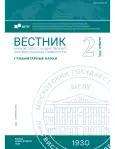Semantics of Reflecting Security Practices in French Proverbs and Sayings
- Authors: Tylets V.G.1, Krasnyanskaya T.M.2
-
Affiliations:
- Moscow State Linguistic University
- Moscow University for the Humanities
- Issue: No 2(896) (2025)
- Pages: 111-118
- Section: Linguistics
- URL: https://journal-vniispk.ru/2542-2197/article/view/284013
- ID: 284013
Cite item
Abstract
The purpose of the study is to identify the peculiarities of the semantics of reflecting security practices in French proverbs and sayings. It is implemented on the basis of a combination of methods of lexical analysis of French dictionaries and semantic analysis of paroemias, revealing French security practices. The main security categories in French are sécurité / séreté and insécurité. The semantic field of security categories in the French language is constructed. It is established that the paroemias about the practice of security in the French language have a heterogeneity in the use of basic categories and elements of their semantic field. A structure has been developed that includes a core, a near and far circle, and a potentially remote circle of controversies about security practices. Its elements have the semantics of reflecting security practices.
About the authors
Valery Gennadievitch Tylets
Moscow State Linguistic University
Author for correspondence.
Email: tyletsvalery@yandex.ru
Doctor of Psychology (Dr. habil.), Professor, Professor at the Department of phonetics and grammar of the French language
Russian FederationTatyana Maksimovna Krasnyanskaya
Moscow University for the Humanities
Email: ktm8@yandex.ru
Doctor of Psychology (Dr. habil.), Professor, Professor at the Department of general, social psychology and history of psychology
Russian FederationReferences
- Mozol, T. S. (2021). Evolution of masculine gender stereotypes in Korean. Vestnik of St. Petersburg University. Oriental and African studies, 13(2), 212–233. (In Russ.)
- Petrova, S. M. (2020). Psychological functions of proverbs in the life and activity of an personalities. The world of science. Pedagogy and psychology, 8(3), 52. (In Russ.)
- Potapova, N. A., Shchukina, D. A. (2020). Russian paremias and the mechanisms of human thinking (the expression of generalized value). Vestnik of the Volgograd State University. Series 2: Linguistics, 19(4), 109–119. (In Russ.)
- Vel’dina, Yu. V., Yasarevskaya, O. N., Komarova, E. Yu., Kulikova, Yu. N. (2022). Reflection of the national mentality of the German nation in proverbs and sayings. Global scientific potential, 8(137), 157–160. (In Russ.)
- Golaydenko, L. N., Bashirova, E. R. (2022). Educational potential of Russian proverbs and sayings about the family. Pedagogical journal of Bashkortostan, 3(97), 12–24. (In Russ.)
- Spivakova, E. M. (2023). Technology for teaching foreign students to use Russian paremias in Russian as a foreign language classes. Pedagogy. Questions of theory and practice, 8(9), 972–978. (In Russ.)
- Bein, K. H. N. (2022). Influence of legal proverbs and sayings on the formation of legal custom (on the example of Russian and German proverbs). Education and law, 7, 254–259. (In Russ.)
- Isakova, S. S. (2015). Semantic characteristics of proverbs and sayings with a component of numbers (based on the material of the Kazakh and French languages). Questions of cognitive linguistics, 2(43), 96–99. (In Russ.)
- Yakovets, T. Ya. (2014). Cognitive signs of the concept of «love» in French proverbs and sayings. Vestnik of Surgut State University, 3(5), 98–100. (In Russ.)
- Semenenko, N. N. (2020). Axiology of paroemias in the focus of the problem of cognitive-discursive modeling of the semantics of Russian proverbs. Vestnik of the Peoples’ Friendship University of Russia. Series: Theory of Language. Semiotics. Semantics, 11(2), 213–23. (In Russ.)
- Boeva, N. E. (2021). Proper name in the composition of modern Belarusian proverbs against the background of Czech parodies. Bohemistyka, 1, 81–96. (In Russ.)
- Krasnianskaya, T. M., Tylets, V. G. (2021). Subjective forecasting of safety practices in extreme situations. Professional’noe obrazovanie v sovremennom mire, 11(3), 102–111. 10.20913/2224-1841-2021-3-10. (In Russ.)
- Malikov, R. Sh. et al. (2019). Ensuring the safety of life and the psychology of negative relationships in the conditions of society according to interpretation in Tatar folk pedagogy (using the example of proverbs and sayings). Vestnik Maikopskogo gosudarstvennogo tekhnologicheskogo universiteta, 3(42), 83–93. (In Russ.)
- Krasnianskaya, T. M., Tylets, V. G. (2020). The trans perspective of security in Russian folk proverbs and sayings. In Zhuravlev, A. L., Kharitonova, E. V., Holondovich, E. N. (Eds.), Istoricheskaya psikhologiya: proshloe, nastoyashchee, budushchee (pp. 432–442). Moscow: Institute of Psychology. RAS. (In Russ.)
- Tylets, V. G., Krasnianskaya, T. M., Lyakhov, A. V. (2024). The subjective representation of Russian proverbs and sayings about security practices. Human Capital, 2(182), 208–218. (In Russ.)
Supplementary files










